- Healthcare systems are designed to meet patients’ needs.
- Medical professionals should be ready to identify at risk groups.
- The selected population for this analysis is people with HIV/AIDS.
- African Americans, Hispanics, transgender women, and intravenous drug users are affected the most.
- This presentation examines the nature of this problem.
- The available solutions and institutions for empowering members of this population are outlined.
Governments develop and implement health systems depending on the medical needs of their respective citizens. Medical professionals and public workers should collaborate and focus on the best ways to meet the demands of underserved populations. Persons with HIV/AIDS fall under the category of at risk groups. This presentation seeks to analyze the nature of problems this vulnerable population faces and offers a detailed analysis of the available programs and solutions to empower such patients.
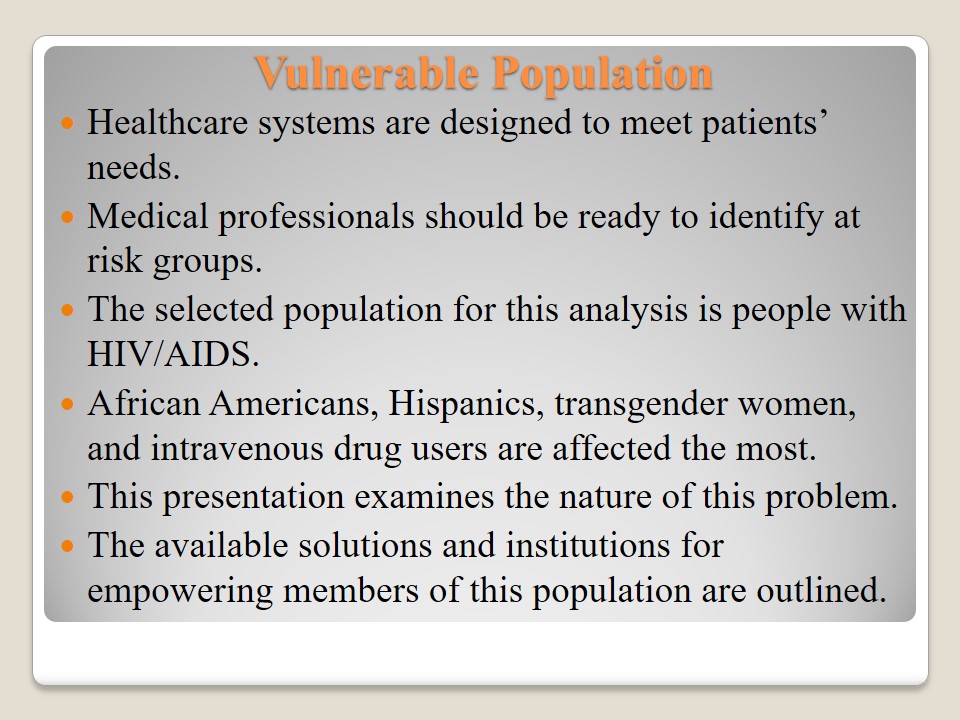
Population Chosen
- The selected vulnerable group is comprised of persons suffering from HIV/AIDS.
- This disease is terminal in nature.
- Affected patients are at risk of various medical complications.
- The current health system does not meet all the demands of such patients.
- A detailed analysis of this population can result in evidence-based solutions.
- The ultimate aim should be to improve HIV/AIDS patients’ lives.
The chosen population for this discussion comprises of persons living with HIV/AIDS. Most of the affected individuals are unable to engage in economic activities and pursue their goals in life. Some of the procedures and measures put in place are incapable of providing the relevant support to most of these patients. Experts acknowledge that there is a need to analyze this health issue and consider the best ways to empower the affected individuals. The involvement of all key players could support the delivery of positive results.
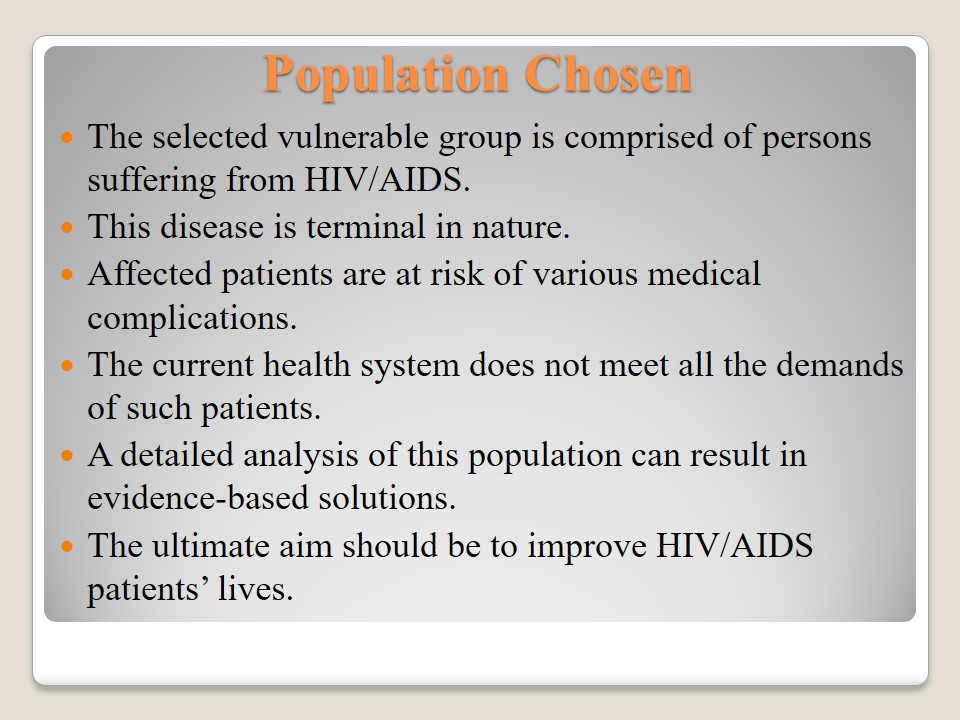
Population Description
- HIV/AIDS affects 1.1 million American citizens (Dingake, 2018).
- Some groups appear to be more affected than others.
- These include Latinos, African Americans, and drug users.
- Transgender groups are also affected by this disease.
- The current opioid epidemic is directly linked to increased cases of HIV/AIDS.
- Affected persons continue to face stigma.
The latest statistics identify HIV/AIDS as a major medical problem affecting the health sector. The disease currently affects over one million citizens. African Americans, Latinos, and persons who use injection drugs tend to be affected the most. Opioid use is also directly linked to the increasing cases of HIV/AIDS transmissions. The government has also revealed that stigma remains a major challenge and it makes it impossible for more people to disclose their statuses. These facts indicate that the country will continue to record more deaths associated with this disease.
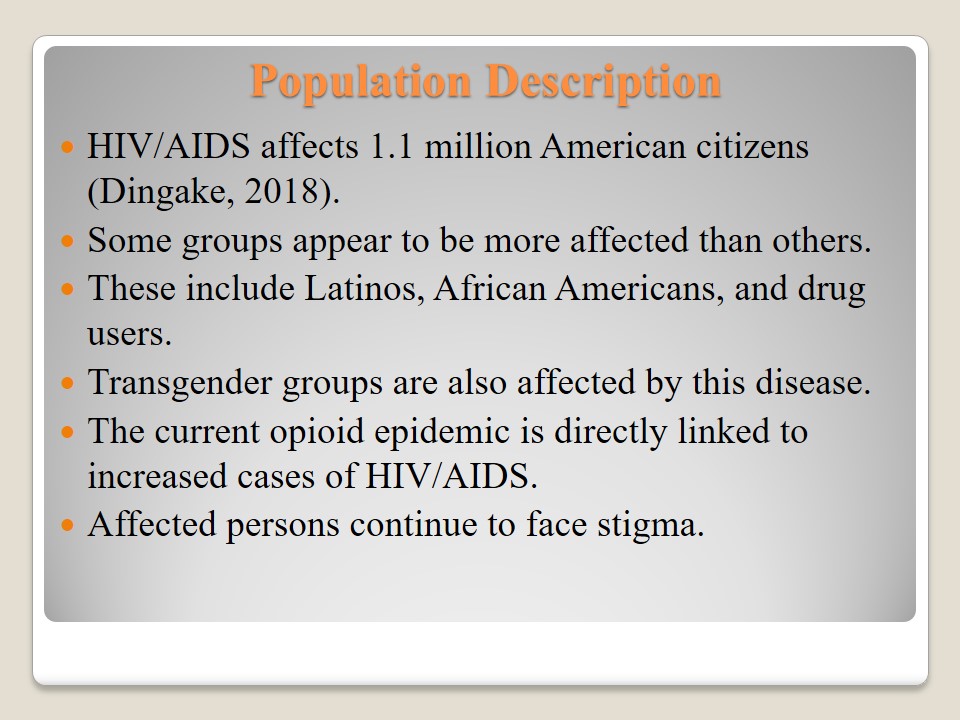
Population Demographics
- HIV/AIDS affects various racial groups differently.
- African Americans account for 13 percent of the total cases (Laurencin et al., 2018).
- However, infection rate for such a group stands at 42 percent annually (Laurencin et al., 2018).
- Infection rate for Latinos is around 27 percent (Dingake, 2018).
- Drug users are also at risk of infection at 15 percent (HIV.gov, n.d.).
- Of all races, bisexual and gay men were affected the most.
- Native Americans account for 1.3 percent of the total HIV/AIDS population (HIV.gov, n.d.).
- However, the rate of new infections remains low for this group.
- Transgender individuals have increased rates of being infected.
- Government initiatives have not focused on the needs of these groups.
- Around 64 percent of the people with this disease receive the relevant medical care (Wansom et al., 2016).
- Proper measures are needed to transform the situation.
The available data reveals that HIV/AIDS is a condition that affects different racial groups disproportionately. For instance, 13 percent of all HIV patients in the country are African Americans. However, the annual infection rate is around 42 percent. This is quite higher in comparison of that of Latinos at 27 percent (Dingake, 2018). Additionally, individuals who rely on injected drugs for recreation and bisexuals have increased chances of getting infected by this deadly disease.
HIV/AIDS continues to affect Native Americans since they account for around 1.3 percent of infections (HIV.gov, n.d.). Although the rate is quite low in comparison with that of the other groups, very little measures have been implemented to address the situation. Transgender groups are also affected by this condition. Government initiatives have also failed to focus on the medical experiences and outcomes of most of the affected individuals. Currently, only 64 percent of the HIV/AIDS population has access to the relevant medical services.
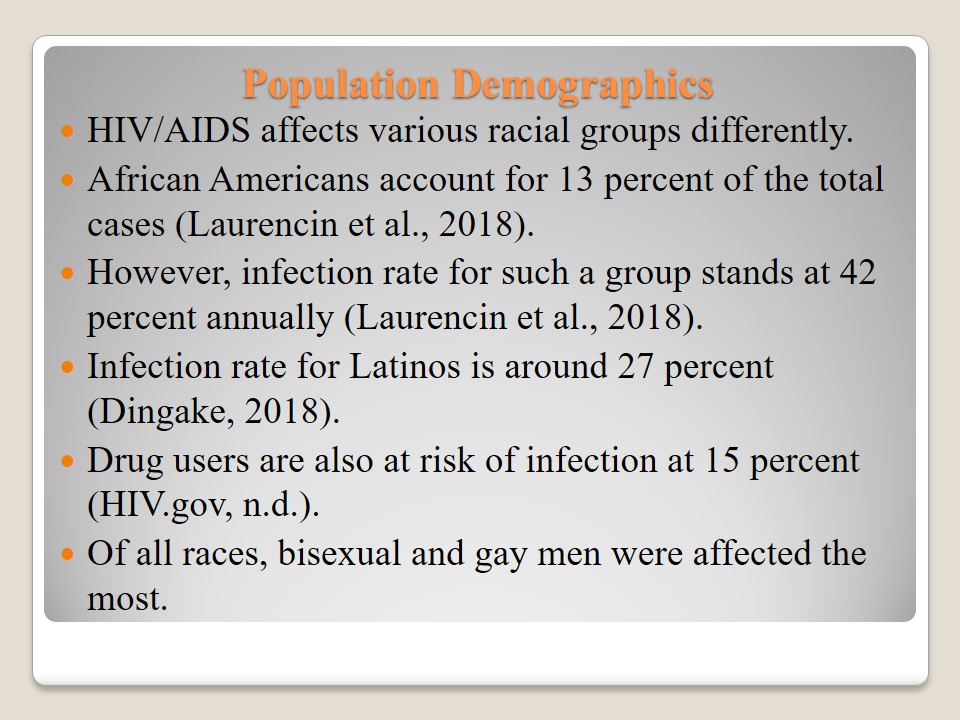
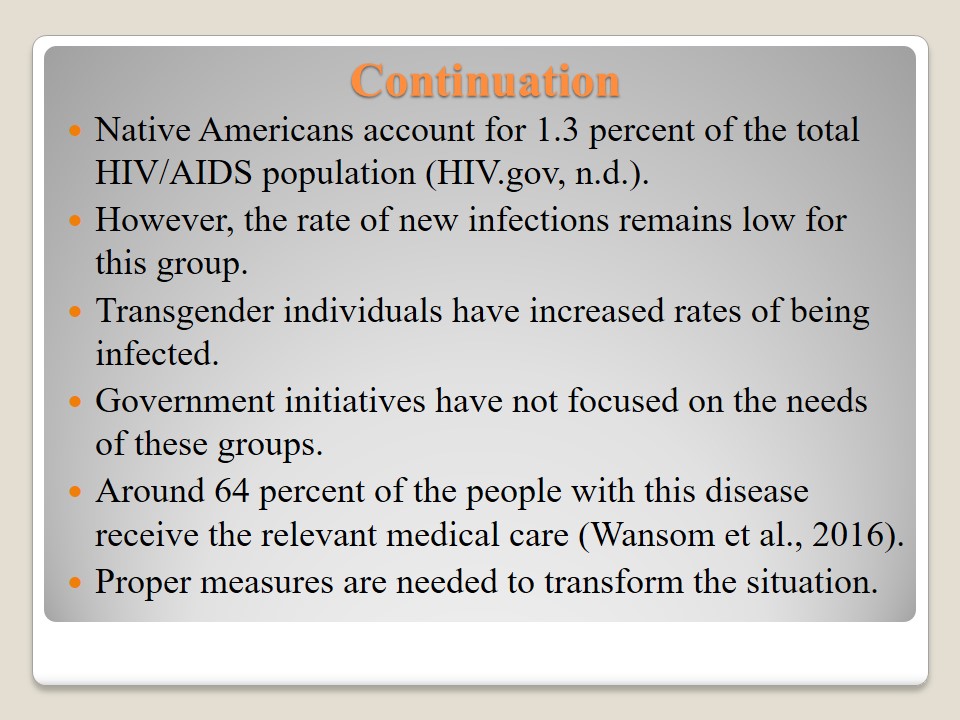
Background of the Problem
- HIV/AIDS has reshaped the American public health.
- The needs of patients compel the government to stretch its operations.
- The disease requires continuous medical support.
- The disease has economic, social, and cultural implications (Wansom et al., 2016).
- Most of the initiatives put in place are still inefficient.
- It forces the established public health systems to focus on the best medical outcomes.
The origin of HIV remains a controversial and highly debated subject in the world today. However, scientists agree that the condition cold have emerged in West Africa where hunters used to consume raw blood from wild animals. The causal agent for the disease is the human immunodeficiency virus. The virus is known to cause or trigger a status known as AIDS. The disease has become a global epidemic that affects individuals and results in a weakened immunity (Laurencin et al., 2018). It remains a leading cause of death in the world today.
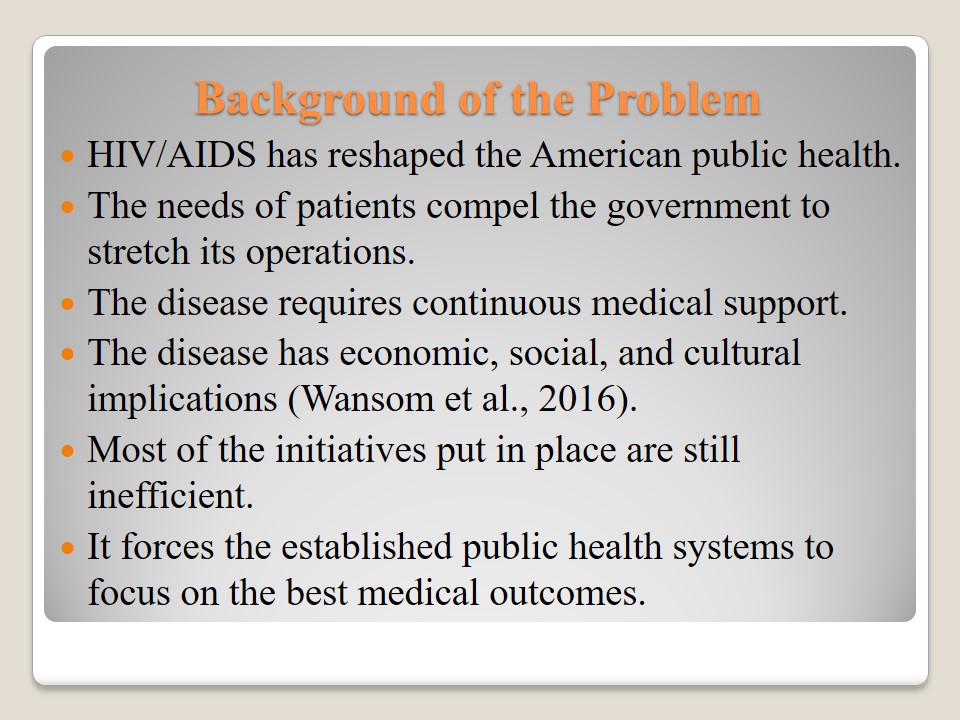
Effects on Public Health
- HIV/AIDS has reshaped the American public health.
- The needs of patients compel the government to stretch its operations.
- The disease requires continuous medical support.
- The disease has economic, social, and cultural implications (Wansom et al., 2016).
- Most of the initiatives put in place are still inefficient.
- It forces the established public health systems to focus on the best medical outcomes.
HIV/AIDS is one of the conditions that have affected the nature and integrity of the public health system. The affected persons require additional support and medical care. Public health officers and community organizers have acquired new tasks to educate and encourage more people to avoid casual sex. These measures reveal why most of the existing agencies are unable to focus fully on other conditions. Such issues explain why the government should take this condition seriously and support vulnerable groups.
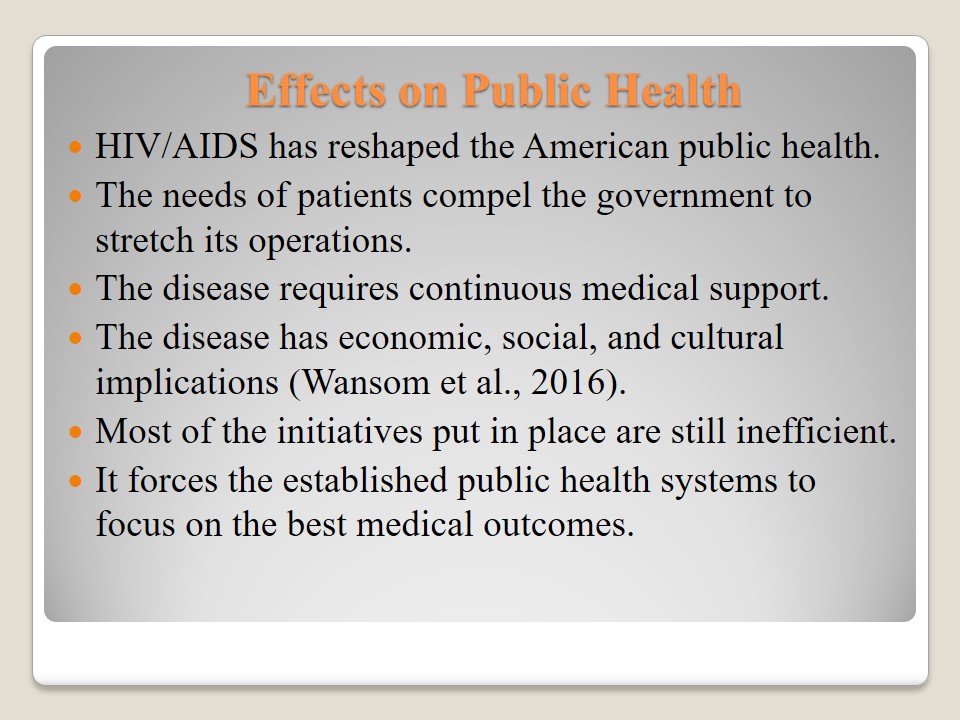
Cultural Background
- The selected vulnerable population comprises of different races.
- Most of the African Americans came to America as slaves.
- They follow unique cultural practices, including herbal medicine and strong family ties.
- Hispanics are economically disadvantages and have fewer opportunities.
- Transgender groups have unique cultural practices.
- These attributes explain why individuals from such cultures and those who have HIV experience numerous challenges.
The selected members of the American society encounter numerous challenges. They have a cultural history that explains their present conditions and experiences. African Americans and Latinos do not have access to numerous economic and social opportunities. Transgender groups encounter negative treatment in their respective settings (HIV.gov, n.d.). Some of the people engage in cultural practices and behaviors that affect their overall health experiences and outcomes. A detailed analysis of these issues can help the government consider new ways to provide proper support.
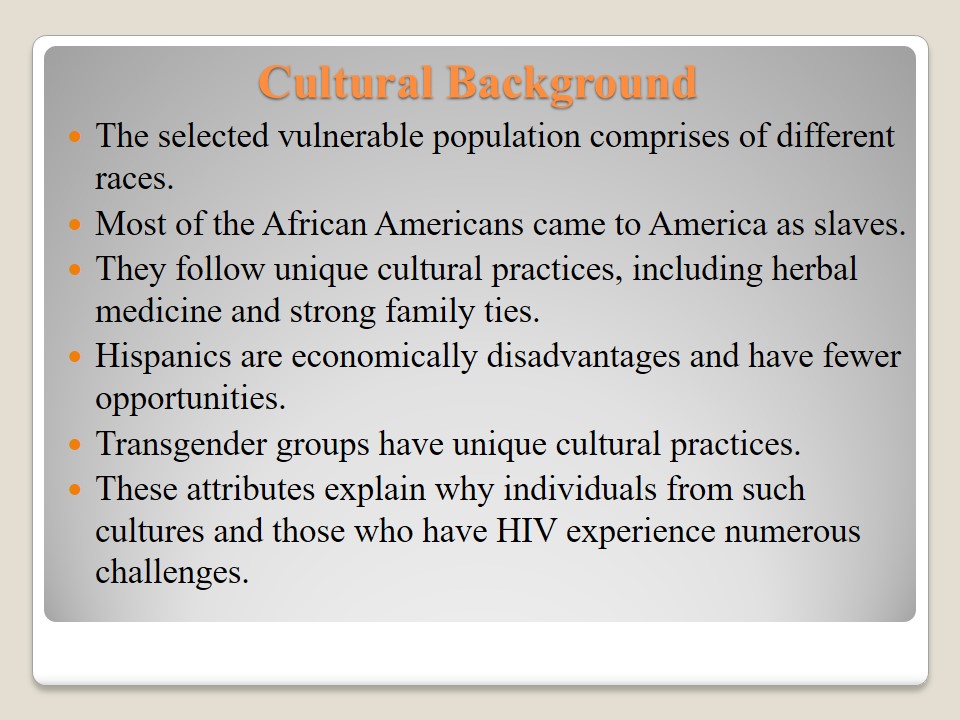
Psychosocial Concerns and Norms
- Minority groups in the United States remain disempowered.
- Some suffer from psychological problems, such as trauma and depression.
- They engage in activities that expose them to HIV/AIDS.
- Transgender groups and drug users encounter diverse challenges.
- Drug sharing and absence of adequate information exposes members of such groups to HIV/AIDS (Laurencin et al., 2018).
- Patients become mentally troubled and incapable of pursuing their goals.
HIV/AIDS patients from the selected vulnerable population experience various challenges and norms. For instance, majority of them lack social and economic opportunities, thus being unable to overcome the challenges of depression and trauma. Those who share drugs lack adequate information about the nature of this disease (Wansom et al., 2016). Transgender individuals have increased chances of engaging in causal or reckless sex to overcome the burden of discrimination and abuse. These norms are to blame for these health problems.
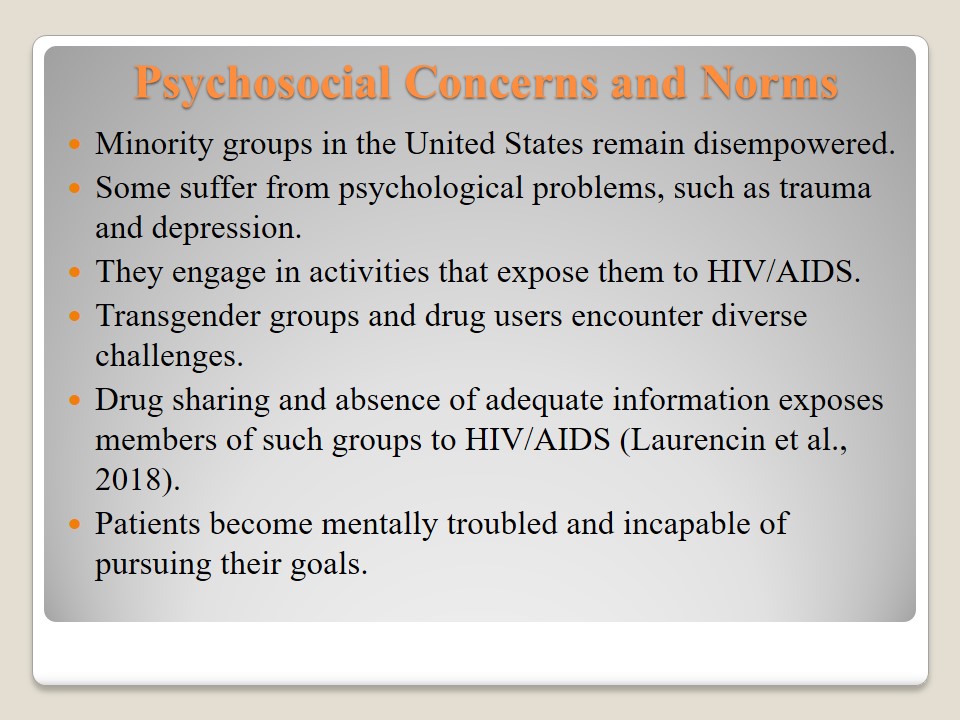
Economic Concerns
- African Americans lack adequate job opportunities.
- Similarly, Hispanics have lower opportunities in comparison with whites.
- Majority of these people perform casual tasks and earn reduced income.
- Transgender groups face discrimination when looking for job opportunities.
- Those with HIV/AIDS are stereotyped and discriminated against (Laurencin et al., 2018).
- The end result is a poor economic experience for most of the affected citizens.
- Members of the vulnerable population under study do not have adequate education.
- Over 40 percent lack college or university education.
- This reality makes it impossible for them to get good jobs.
- Majority of them have blue-collar jobs or part-time occupations.
- These facts explain why they earn very little.
- Proper mechanisms to address these issues are currently missing.
The selected population experiences numerous challenges and economic obstacles. For instance, African Americans do not get adequate job opportunities. This happens to be the same case for Hispanics and other minority groups. Transgender groups and persons suffering from addiction will be unable to get competitive opportunities. The situation is usually worse for individuals who have HIV/AIDS. Consequently, most of these individuals will encounter numerous problems and eventually record negative health outcomes.
Statistics reveal that almost half of citizens from minority groups do not have college education. This reality means that such individuals would find it hard to apply and get new jobs in the country. Consequently, the citizens are compelled to complete blue-collar jobs or focus on casual labor (Laurencin et al., 2018). Those who have HIV/AIDS would encounter additional problems since they face discrimination. Most of the patients will earn less competitive income and find it hard to pursue their social and economic goals. The government is yet to implement proper measures to mitigate most of these issues.
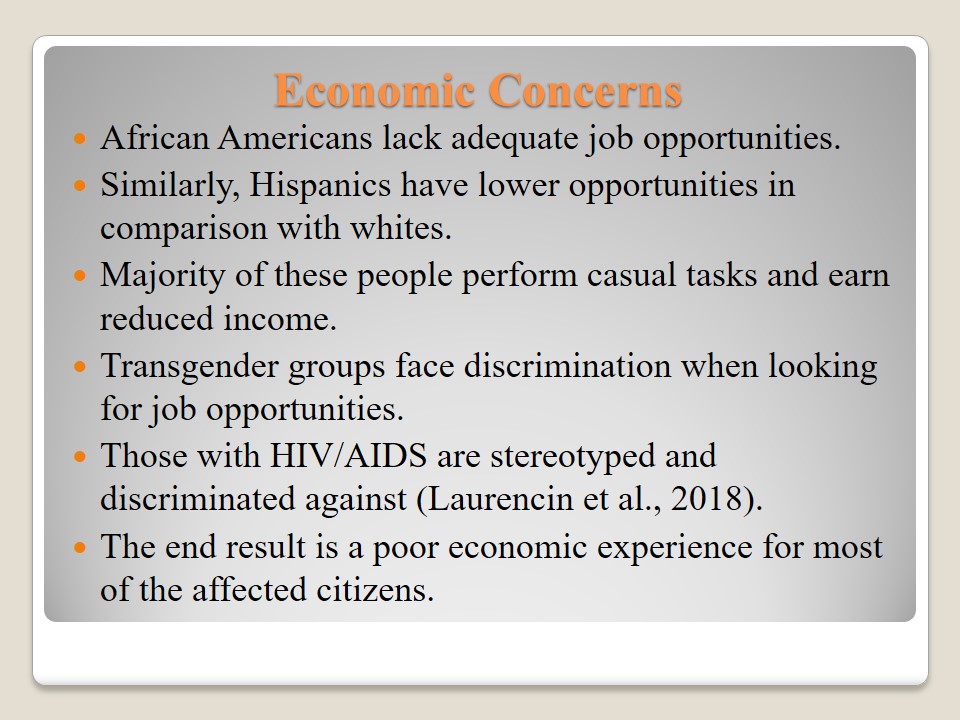
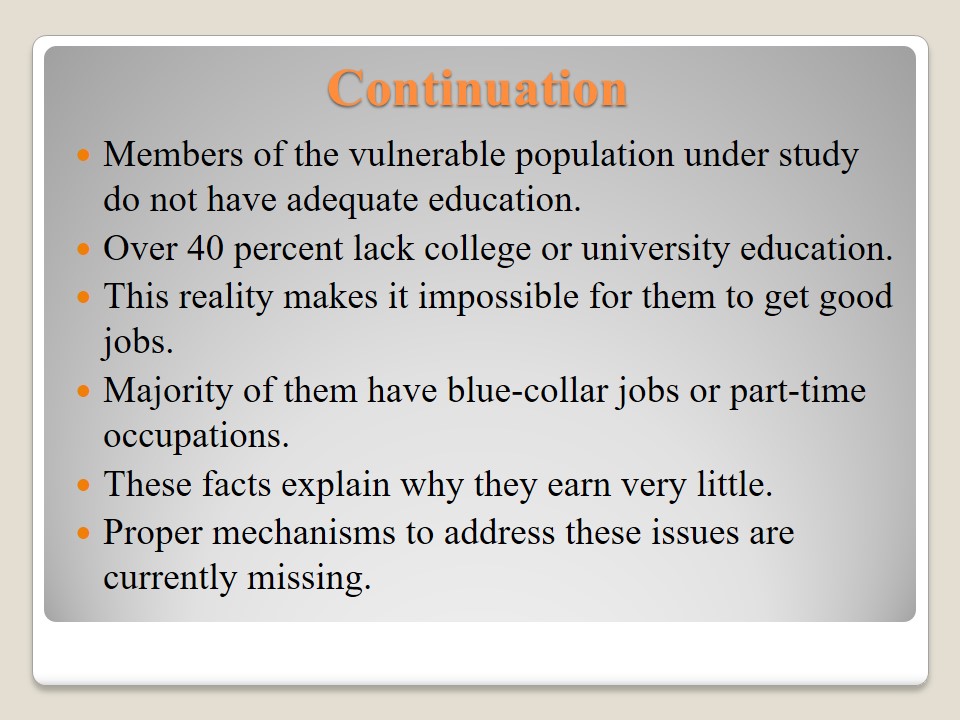
Health Concerns
- The selected vulnerable population experiences negative health outcomes.
- Patients have little or no access to timely medical services.
- Individuals have weakened body immunity (Wansom et al., 2016).
- Opportunistic conditions are common, such as diabetes, kidney disease, and cognitive disorders.
- Poor economic position affects their ability to get medical services.
- Existing health programs and facilities are inadequate.
Most of the people with HIV/AIDS encounter diverse medical challenges due to absence of proper programs and clinics. The disease exposes them to additional complications and illnesses. Some of the leading ones include kidney disease, dementia, diabetes, and cardiovascular diseases. Most of the affected patients are usually unable to meet their medical demands due to their economic situations. The relevant government agencies are, therefore, compelled to channel most of the available medical resources to meet the needs of this population.
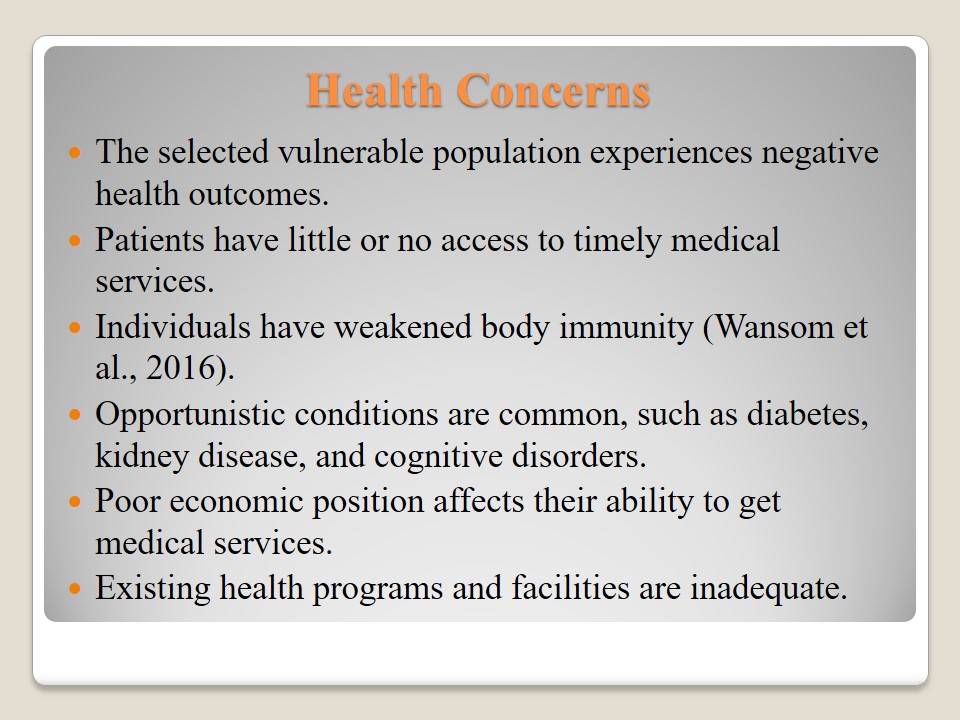
Risk Factors
- Minority groups lack adequate information and support systems.
- Some engage in unprotected or casual sex.
- Poor educational attainment is associated with higher HIV prevalence.
- Unemployed and unmotivated persons start to abuse drugs.
- Lack of proper medical support increases chances of developing additional complications.
- These factors work synergistically to dictate the nature of this medical problem.
African Americans and Hispanics encounter more or less the same forces that dictate their overall health experiences and outcomes. For instance, those who have not acquired adequate education will tend to engage in unprotected sex and increase their chances of contracting this disease. Most of the patients will lack adequate information and resources to seek personalized or timely medical support (Gleton et al., 2020). The absence of adequate resources and makes it hard for members of this population to record positive health experiences or outcomes. The same risks are available for drug addicts and transgender individuals.
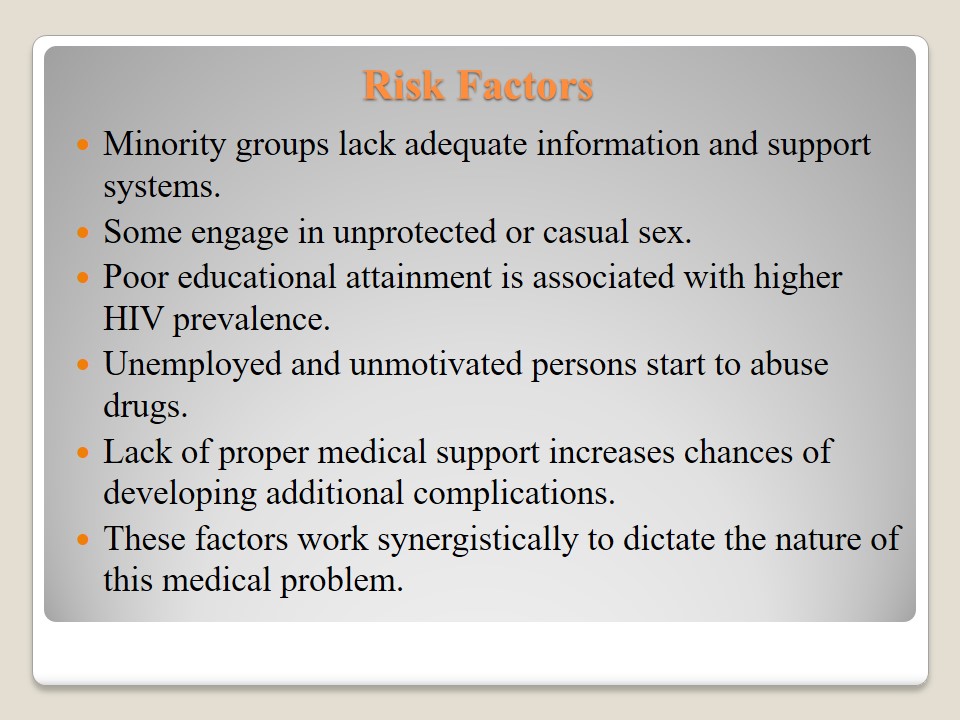
Prevention and Control
- Several preventative measures are available to meet the demands of the selected population.
- Primary prevention entails provision of timely information.
- This approach could include guiding people to use protection during sex and avoid sharing needles.
- Secondary prevention entails mass testing to identify infected persons and guide them to live positively.
- Tertiary prevention is the provision of antiretroviral therapy (ART) drugs (Gleton et al., 2020).
- Affected persons can be guided to attend clinics and avoid infecting others.
The outlined risk factors and health concerns explain why proper prevention measures for this condition are critical. For the selected vulnerable population, it would be possible to educate more members about the dangers of HIV/AIDS and how to avoid being infected. This will be followed by continuous testing to identify persons with and those without HIV. The next move will be to offer tertiary support whereby patients will get ART drugs. The sick will be required to attend clinics and get the relevant medical support.
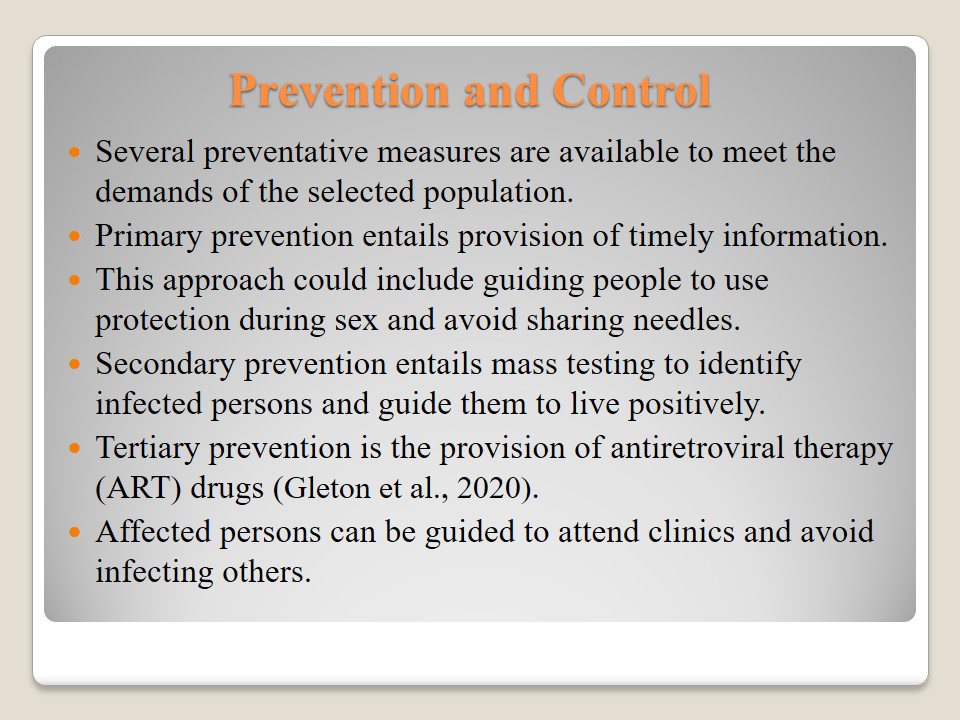
Public Health Nurse
- Public health nurses can play significant roles to help vulnerable populations.
- The can begin by providing adequate knowledge to individuals at risk.
- They will offer information for preventing infections and seeking medical support (Gleton et al., 2020).
- They will complete evaluations to determine the effectiveness of implemented interventions.
- They will go further to provide personalized care to individuals at their homes.
- Their actions will help reduce the prevalence rate for this condition.
Public health nurses possess adequate competencies that resonate with their roles and responsibilities. Such professionals will identify individuals at risk and offer timely information. The beneficiaries will engage in actions that can reduce infections. They will launch new interventions and consider how primary, secondary, and tertiary approaches work to address the HIV/AIDS epidemic. They will offer personalized support and guidelines to support the delivery of positive results.
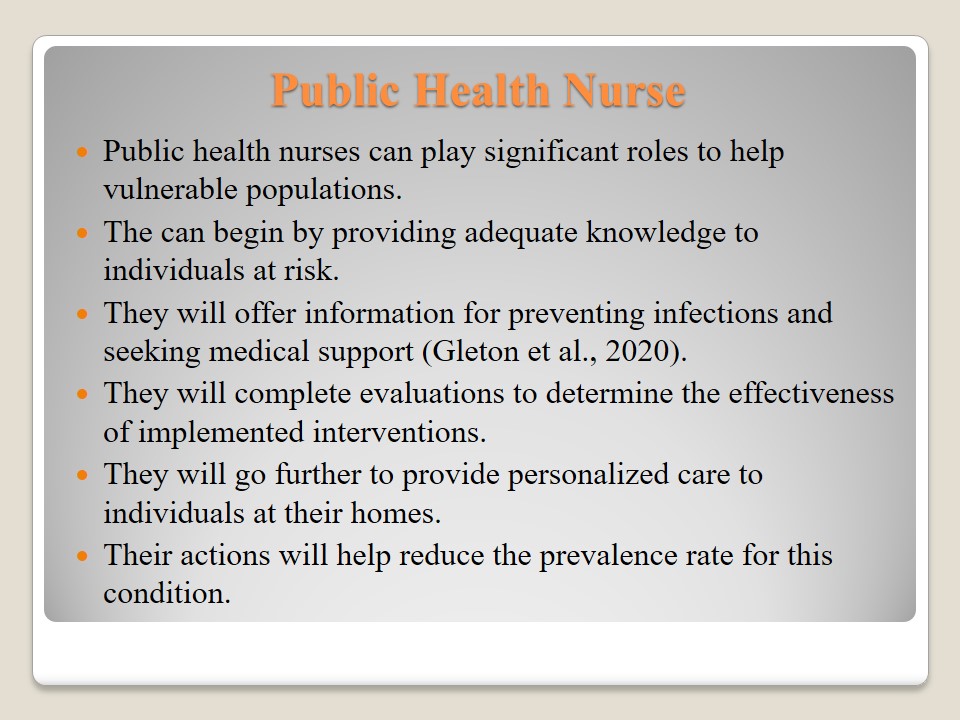
Public Health Core Functions
- These are the three core functions of public health: assessment, assurance, and policy development.
- Professionals will monitor the health demands of the at risk group.
- This will be followed by policies aimed at educating and empowering the people.
- Community actions and partnerships are capable of delivering positive results (Gleton et al., 2020).
- Assurance revolves around the formulation and implementation of regulations.
- Such measures are intended to deliver the best results.
The core functions of public heath include assessment of health conditions in a specific community, development of proper policies, and creation of laws and guidelines that will maximize assurance. These measures can work effectively to meet the demands of the selected vulnerable population. The involvement of all key partners and government agencies and the provision of adequate resources can help persons with HIV/AIDS lead longer lives and achieve their maximum potential.

Three Local Agencies
- Several agencies and facilities exist to provide medical support to this vulnerable population.
- First, the Ryan White HIV/AIDS program provides resources to end this epidemic.
- Second, local regions have community-based health facilities, such as hospitals and clinics.
- Third, the Office of HIV/AIDS offers leadership to support various organizations when responding to this disease.
- The actions of these agencies help reduce the negative impacts of HIV/AIDS (Gleton et al., 2020).
- Members of this population have benefited significantly from such agencies.
The United States have several facilities at the local level intended to meet the medical needs of persons with HIV/AIDS. This analysis has centered on some of the efforts targeting people from the selected minority groups. The identified ones include the Ryan White HIV/AIDS Program, medical hospitals and clinics, and the Office of HIV/AIDS. The efforts and missions of such agencies have made it possible for this country to achieve positive outcomes.
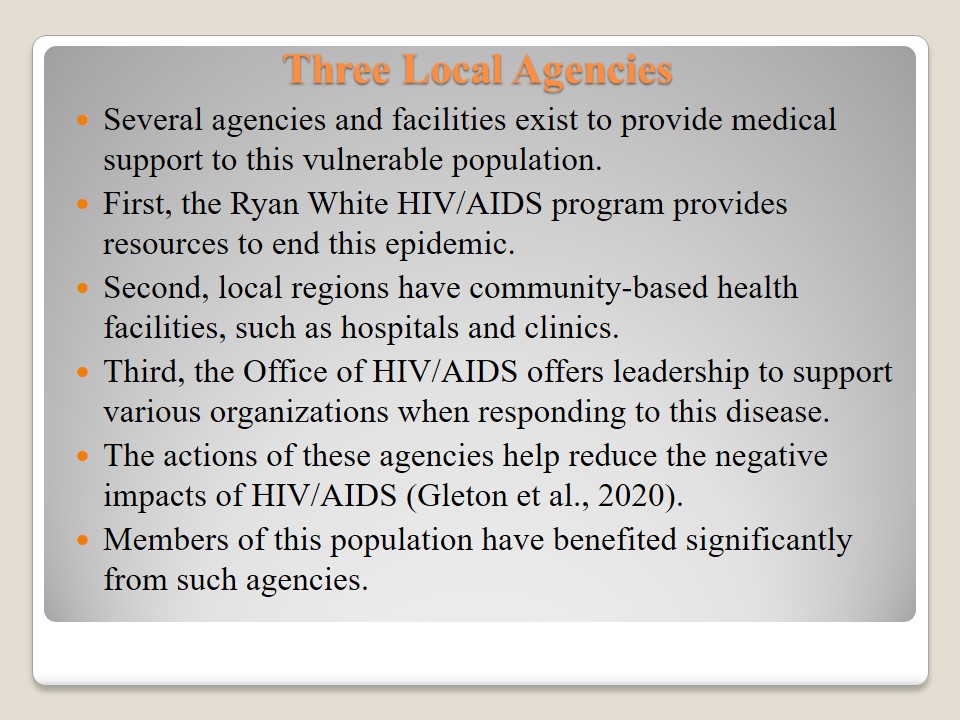
Accessibility and Services Rendered
- Most of the patients are able to access the available services.
- The Ryan White HIV/AIDS program is capable of providing community-based resources.
- Hospitals in the country provide timely treatment to these patients.
- The Office of HIV/AIDS is accessible to all willing patients (Laurencin et al., 2018).
- This office presents guidelines and liaises with other agencies to tackle the challenges of HIV/AIDS.
- However, some patients still find it hard to benefit from such programs or services.
The identified resources are designed in such a way that they help the U.S. address the burden of this epidemic. While most of the people have access to such programs, there are some gaps that continue to exist. Such agencies coordinate their operations with other facilities to support the delivery of positive results. Additional measures would be appropriate to ensure sustainable results are eventually recorded.
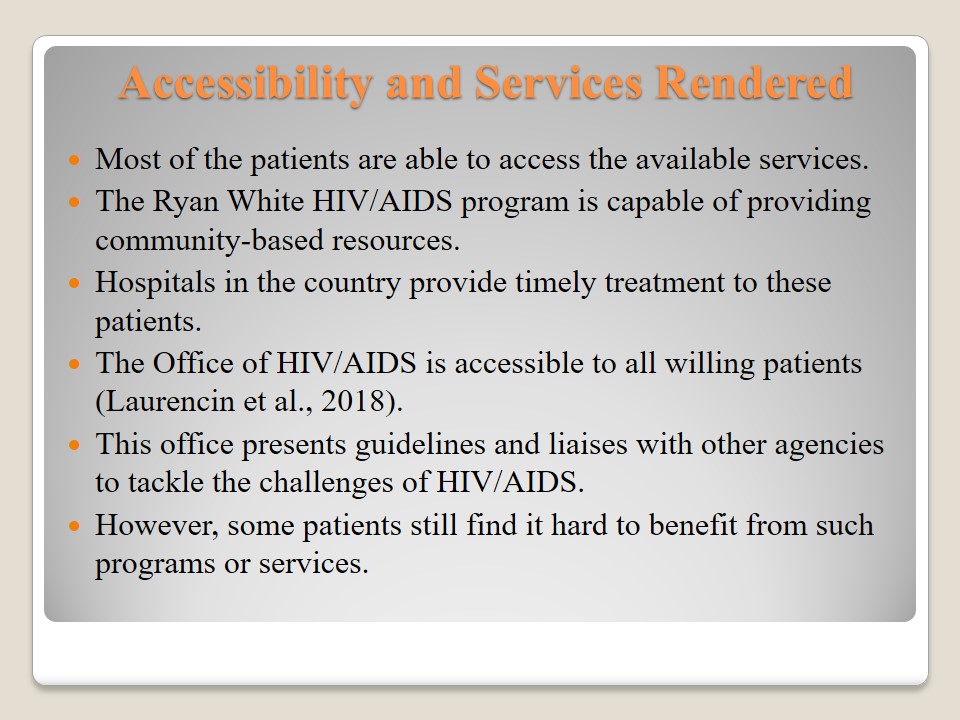
Additional Resources
- The affected community could benefit from additional resources.
- The first one is the launch of campaigns aimed at delivering primary and secondary prevention.
- The second one could be drives aimed at encouraging people to get tested and seek the relevant medical support.
- The third one could be facilities providing ART drugs to patients (Laurencin et al., 2018).
- Learning institutions could also become part o f the strategy to tackle this disease.
- The primary focus should be on members of the selected target population.
The United States is yet to address the challenge of HIV/AIDS and transform the lives of the affected patients. The consideration and inclusion of additional resources is an evidence-based approach for delivering timely results. The proposed ones could include HIV/AIDS campaigns, testing drives, and provision of ART drugs. Learning institutions could be instrumental towards supporting the delivery of timely results.
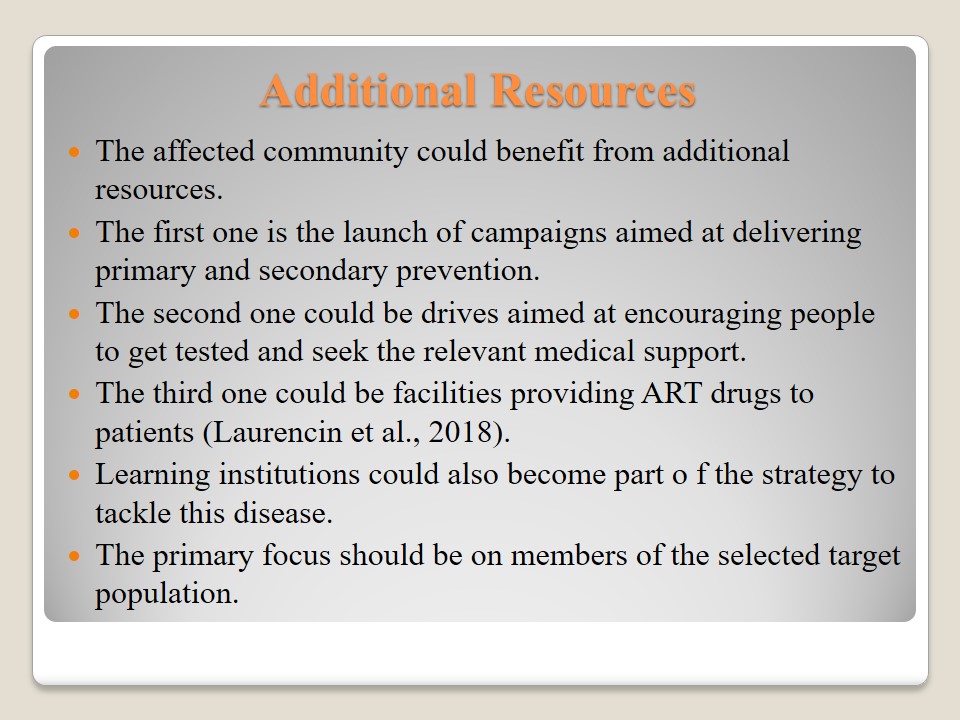
Conclusion
- The completed presentation has identified a unique population facing the challenges of HIV/AIDS.
- The U.S. continues to grapple with this deadly disease.
- Some of the measures and facilities put in place are inadequate.
- Social and cultural dynamics dictate the recorded gains and problems.
- The consideration of evidence-based measures and resources will deliver positive results.
- The ultimate goal is to empower and meet the needs of these underserved citizens.
The HIV/AIDS epidemic continues to affect many innocent Americans. Persons from minority groups, users of intravenous drugs, and transgender women are affecting the most. Proper measures and efforts would be needed to meet the demands of these individuals. The consideration of the proposed additional resources can make a difference and make it possible for more patients to lead better and healthier lives.
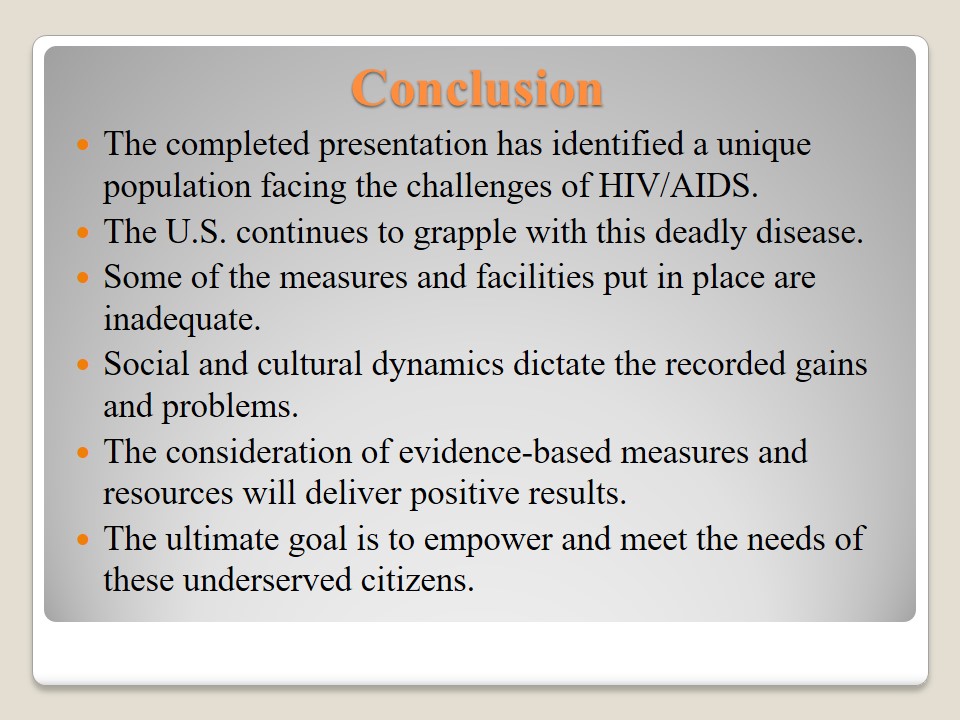
References
Dingake, O. B. K. (2018). The state of human rights in relation to key populations, HIV and sexual and reproductive health. Reproductive Health Matters, 26(52), 46-50. Web.
Gleton, B., Jahanfar, S., Inungu, J., & Latty, C. (2020). Factors associated with condom use among African American and Hispanic/Latino youth. European Journal of Environment and Public Health, 4(1), em0033. Web.
HIV.gov. (n.d.). Who is at risk for HIV. Web.
Laurencin, C. T., Murdock, C. J., Laurencin, L., & Christensen, D. M. (2018). HIV/AIDS and the African-American community 2018: A decade call to action. Journal of Racial and Ethnic Health Disparities, 5(3), 449-458. Web.
Wansom, T., Guadamuz, T. E., & Vasan, S. (2016). Transgender populations and HIV: Unique risks, challenges and opportunities. Journal of Virus Eradication, 2(2), 87-93. Web.